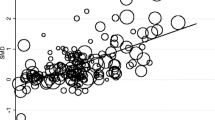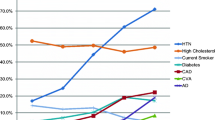The clinical and neurochemical characteristics of non-dementia cognitive disorders were studied in 102 patients with atherosclerotic carotid sclerosis, with assessment of their dynamics after carotid endarterectomy (CEAE). Mild cognitive disorders were seen in 37 patients (36.3 %) and moderate cognitive disorders in 36 patients (35.3 %). Moderate cognitive impairments were significantly more common in patients with symptoms of carotid stenosis, dominated by structural changes in the brain on neuroimaging (leukoaraiosis and infarcts); unstable atherosclerotic plaques, with a predominance of the hypodense component, were also more frequent. This suggests that cognitive dysfunction in patients with atherosclerotic carotid stenosis results not only from decreased perfusion, but also from arterio-arterial microembolism. CEAE was found to have favorable effects on cognitive functions. Positive changes were marked in patients with asymptomatic carotid stenosis. However, CEAE could also have adverse influences on cognitive functions in patients with moderate cognitive disorders of dysmnestic type and symptoms of carotid stenosis.
Similar content being viewed by others
References
L. V. Golubeva, Effects of Carotid Endarterectomy on Neurological and Neuropsychological Functions [in Russian], Author’s Abstract of Master’s Thesis in Medical Sciences, Moscow (2006).
I. V. Damulin, “Vascular dementia,” Nevrol. Zh., 3, 4–11 (1999).
I. V. Damulin, Alzheimer’s Disease: Problems and Perspectives [in Russian], Moscow (2003).
I. V. Damulin, “Vascular dementia: some pathogenetic, diagnostic, and therapeutic aspects,” Russ. Med. Zh., 16, No. 5, 8–13 (2008).
N. B. Zhulev, N. A. Yakovlev, D. V. Kandyba, and G. Yu. Sokurenko, Stroke of Extracranial Origin [in Russian], SbPMAP Press, St. Petersburg (2004).
V. V. Zakharov, “Alzheimer’s disease: biology, diagnosis, and treatment,” Nevrol. Zh., 1, 50–56 (1999).
V. V. Zakharov and N. N. Yakhno, Memory Impairments [in Russian], GeotarMed, Moscow (2003).
V. V. Zakharov and N. N. Yakhno, “Moderate cognitive impairment syndrome in the elderly: diagnosis and treatment,” Russ. Med. Zh., 10, 9–12, (2004).
A. S. Kadykov, L. S. Manvelov, and N. V. Shakhporonova, “Chronic vascular brain diseases (dyscirculatory encephalopathy), GeotarMed, Moscow (2006).
A. Yu. Lavrov and M. V. Shumilina, “Clinical, neuropsychological, neuroimaging, and ultrasonographic characteristics of stage III dyscirculatory encephalopathy,” Nevrol. Zh., 11, No. 4, 9–14 (2006).
O. S. Levin,V. V. Akhmetov, and L. V. Golubeva, “Dynamics of cognitive functions in patients with atherosclerotic stenosis of the carotid arteries after carotid endarterectomy,” Nevrol. Zh., 11, No. 4, 14–19 (2006).
A. B. Lokshina and V. V. Zakharov, “Mild and moderate cognitive disorders in dyscirculatory encephalopathy,” Nevrol. Zh., 11, Supplement 1, 57–64 (2006).
A. R. Luriya, Basic Neuropsychology [in Russian], Akademiya, Moscow (2002).
Z. A. Suslina (ed.), Essays in Angioneurology. Handbook for Doctors [in Russian], Atmosfera, Moscow (2005).
D. A. Padabed, Assessment of the State of Cognitive Functions in Patients Undergoing Reconstructive Surgery on the Coronary Arteries [in Russian], Author’s Abstract of Master’s Thesis in Medical Sciences, Chelyabinsk (2008).
N. N. Yakhno and V. V. Zakharov, “Memory impairments in neurological practice,” Nevrol. Zh., 4, 4–9 (1997).
N. N. Yakhno and V. V. Zakharov, “Mild cognitive disorders in the elderly,” Nevrol. Zh., 9, No. 1, 4–8 (2004).
N. N. Yakhno, “Cognitive disorders in neurological practice,” Nevrol. Zh., 11, Addendum 1, 4–12 (2006).
N. N. Yakhno, V. V. Zakharov, A. B. Lokshina, et al., Dementia. A Handbook for Doctors [in Russian], Medpress, Moscow (2010).
U. Angeloni, L. Bozzao, S. Bastianello, et al., “Internal borderzone infarction following acute middle cerebral artery occlusion,” Neurology, 40, 1196–1198 (1990).
R. Barba, S. Martinez-Espinosa, E. Rodriguez-Garcia, et al., “Poststroke dementia: clinical features and risk factors,” Stroke, 31, 1494–1501 (2000).
L. R. Caplan and M. Hennerici, “Impaired clearance of emboli (washout) is an important link between hypoperfusion, embolism, and ischemic stroke,” Arch. Neurol., 55, 1475–1482 (1998).
B. Censori, O. Mariara, C. Agostinis, et al., “Dementia after first stroke,” Stroke, 27, 1205–1210 (1996).
B. Dubois, A. Slachevsky, I. Litvan, and B. Pillon, “A frontal assessment battery at bedside,” Neurology, 55, 1621–1626 (2000).
M. F. Folstein, S. E. Folstein, and P. R. McHugh, “Mini-mentalstate: a practical method for grading the cognitive state of patients for the clinician,” J. Psychiatr. Res., 12, 189–198 (1975).
E. A. Gaudino, M. W. Geisler, and N. K. Squires, “Construct validity in the trail making test: what makes part B harder?” J. Clin. Exp. Neuropsychol., 17, No. 4, 529–535 (1995).
A. C. Gray-Weale, J. C. Graham, J. R. Burnett, et al., “Carotid artery adenoma: Comparison of preoperative B-mode ultrasound appearance with carotid endarterectomy specimen pathology,” J. Cardiovasc. Surg., 29, 676–681 (1988).
E. Grober, H. Bushke, and H. Crystal, “Screening for dementia by memory testing,” Neurology, 38, 900–903 (1988).
H. Henon, I. Durieu, D. Guerouaou, et al., “Poststroke dementia: incidence and relationship to prestroke cognitive decline,” Neurology, 57, 1216–1222 (2001).
E. J. Heyer and R. A. Sharma, “Controlled prospective study of neuropsychological dysfunction following carotid endarterectomy,” Arch. Neurol., 59, 217–222 (2002).
R. N. Kalaria, “The role of cerebral ischemia in Alzheimer’s disease,” Neurobiol. Aging, 21, 321–330 (2000).
P. H. Lee, O. Y. Bang, S. H. Oh, et al., “Subcortical white matter infarcts. Comparison of superficial perforating artery and internal border-zone infarcts using diffusion-weighted magnetic resonance imaging,” Stroke, 34, 2630–2633 (2003).
M. D. Lezak, Neuropsychological Assessment, Oxford University Press, New York (1995).
E. B. Mathiesen, K. Waterloo, O. Joakimsen, et al., “Reduced neuropsychological test performance in asymptomatic carotid stenosis,” Neurology, 62, 695–701 (2004).
J. T. O’Brien, T. Erkinjuntti, B. Reisberg, et al., “Vascular cognitive impairment,” Lancet Neurology, 2, 89–98 (2003).
R. S. Petersen and J. Touchon, “Consensus on mild cognitive impairment,” Research and Practice in Alzheimer’s Disease, 10, 24–32 (2005).
R. Rao, “The role of carotid stenosis in vascular cognitive impairment,” Eur. Neurol., 46, 30–34 (2001).
B. J. Small, J. L. Mobly, J. Laukka, et al., “Cognitive deficits in preclinical Alzheimer’s disease,” Acta Neurol. Scand., 107, 29–33 (2003).
J. R. Stroop, “Studies of interference in serial verbal reactions,” J. Exp. Psychol., 18, 643–662 (1935).
J. Tian, R. S. Buck, L. Haworth, et al., “Neuropsychological prediction of conversion to dementia from questionable dementia: statistically significant but not yet clinically useful,” J. Neurol. Neurosurg. Psych., 74, 433–438 (2003).
Author information
Authors and Affiliations
Corresponding author
Additional information
Translated from Zhurnal Nevrologii i Psikhiatrii imeni S. S. Korsakova, Vol. 111, No. 3, pp. 31–37, March, 2011.
Rights and permissions
About this article
Cite this article
Yakhno, N.N., Fedorova, T.S., Damulin, I.V. et al. Effects of Carotid Endarterectomy on the Dynamics of Cognitive Impairments in Patients with Atherosclerotic Stenosis of the Carotid Arteries. Neurosci Behav Physi 42, 543–549 (2012). https://doi.org/10.1007/s11055-012-9598-7
Published:
Issue Date:
DOI: https://doi.org/10.1007/s11055-012-9598-7




